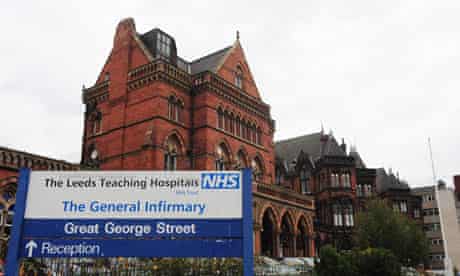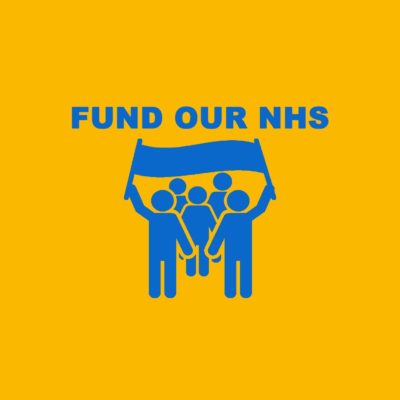
John Puntis, Co-Chair of Keep Our NHS Public explains why Leeds Keep Our NHS Public will be protesting the the winter crisis this Saturday 15th February, as part of our Winter Crisis Day of Action.
Leeds Keep Our NHS Public (KONP) has invited its supporters, NHS campaigners, members of the public, trade unionists, NHS workers and Labour Party branches to bring banners, music and speeches to a demonstration outside the hospital on the 15th February, calling attention to the winter crisis and ongoing serious underfunding issues. Although a multitude of promises about the NHS were spouted by the Tories during the election campaign, many unravelled as soon as they were made.
The headline grabbing additional funding (£34 billion in cash - only £20.5 billion in real terms) is wholly inadequate to address manpower issues, maintenance backlogs and necessary capital developments including much needed new equipment and new services.
Pressure at Leeds General Infirmary Hits Election Headlines
Leeds hit the headlines during the election because a sick child (Jack Williment) was pictured in A&E lying on the floor while waiting for a hospital bed to become available. This was due to a huge increase in acute paediatric admissions at the time from influenza and other respiratory infections, and prompted a sincere apology to parents from both the Chief Executive and the Medical Director of Leeds General Infirmary.
Matt Hancock was sent north to try and contain the adverse publicity, while the Tory misinformation machine swung into action on social media. Suggestions were made, implausibly that not only the hospital executives but also the Secretary of State for Health had been taken in by a faked photograph, without first having gone to the trouble of establishing the facts on the ground. Preposterous though this suggestion was, it is an indication of how important (thanks to campaigners) the NHS had become in the election campaign.
Tory head office also made use of Hancock’s visit by claiming a party aide had been assaulted in a demonstration outside the hospital, and mention was made of 100 protestors being bussed in at short notice. Unfortunately, the film footage that followed soon afterwards showed this account also to be untrue – in fact it showed only one man holding a bicycle and remonstrating with a rapidly retreating Hancock - and no violence at all.
As a large specialist tertiary centre, Leeds has in some ways been relatively protected from cuts in funding and services compared with elsewhere in Yorkshire. Like everywhere else, however, staffing problems are acute and staff under very considerable pressure (reflected in record sickness absence statistics for psychological disorders).
Desperate need for building repairs
The national figure needed to fund backlog maintenance work stands at £6.6 billion (60% higher than five years ago), with Leeds Teaching Hospitals accounting for £109 million. In November, the Trust risk register was brought to the attention of the Yorkshire Evening Post by KONP members and highlighted in a three page newspaper spread.
Risks are scored from ‘very low’ to ‘high’ risk, and then above this there is the highest category of ‘significant risk’. At the November hospital Board meeting, the following were rated in this highest category:
- Not enough nurses to meet safest possible standards
- Insufficient medical staff to deliver services
- Problems with the preparation of medicines through lack of staff
- Adverse effect of losing staff through Brexit
- Medical records failure and risk of cyber attack from outdated IT equipment
- Power failure through outdated electrical infrastructure
- Inability to provide life saving specialist feeds for some patients
- Unsafe outdated equipment in the cardiac laboratories
- Failure to meet financial targets; inadequate resources to update medical equipment
- Failure to meet A&E target
- Failure to meet referral time to treatment and cancer targets
- Failure to rebook cancelled operations within 28 days
- Insufficient capacity for emergency admissions
- Waits of over 52 weeks for some operations
- Excessive waiting times for some tests.
"40 new hospitals"
Johnson’s promise of 40 new hospitals turned out to be only six refurbishments, with a long way to go before any building is started. Leeds Infirmary is one of these ‘new hospitals’ but in reality this turns out to be two new wings – one a unit for adult outpatients, intensive care and day case procedures, and the other a building to bring together current children’s beds under one roof.
Welcome those these will be (should they ever materialise), Jack’s plight as highlighted in the national media was a stark reminder of chronic pressures on reducing numbers of hospital beds. Despite an obvious shortage in Leeds, the new ‘Children’s Hospital’ will not increase the overall bed base (and may even reduce it), to the frustration of medical and nursing staff who grapple with the problems of bed shortages on a daily basis including frequent cancellation of elective surgery, and the misery of children and families.
Poor local NHS performance
Leeds KONP members took the opportunity of public questions at the January CCG meeting to ask about poor performance highlighted in other areas in data published by NHS England up to the end of December 2019:
- Two month wait from GP urgent referral to first treatment for cancer - since October 2009 Leeds has never met the 85% standard, although came close in late 2012. From then on there has been a steady fall with a more precipitous deterioration over the last 3 years to a figure around 68% in October 2019.
- Two month wait following a consultant decision to upgrade the case priority for a first treatment for cancer - Leeds is dong worse than a number of other Yorkshire cities, but worryingly, with a steadily deteriorating performance falling from 90% in 2010 to around 73% in October 2019.
- Percentage of patients in A&E spending <4 hours from arrival to admission, transfer or discharge. This has fallen from just over 90% (the original target was over 95%) to around 68%, although this parallels national averages. Does the CCG agree with the Secretary of State for Health and Social Care, Matt Hancock, that abolishing the target is the solution to this problem?
- Trolley waits: number of patients spending >4 hours from decision to admit to admission. Leeds generally has the highest number of patients in this category compared with 6 other Yorkshire cities, with the figure having increased from around 300 in June 2018 to 1800 (a 6 fold rise) in December last year.
The CCG has promised both a detailed written response and a face to face meeting to discuss these questions. The risk register gives an idea of the pressures being managed in the system at present and gives a clear impression of the fact that hospitals are being stretched to breaking point. The demonstration on 15th February is an opportunity for the people of Leeds to show support for staff, but also to say “enough is enough” and call for a properly funded, publicly provided, delivered and accountable national health service.
John Puntis, Leeds KONP
Find out more about our Winter Crisis Day of Action, and get hold of resources for holding your own protest.







Leave a Reply